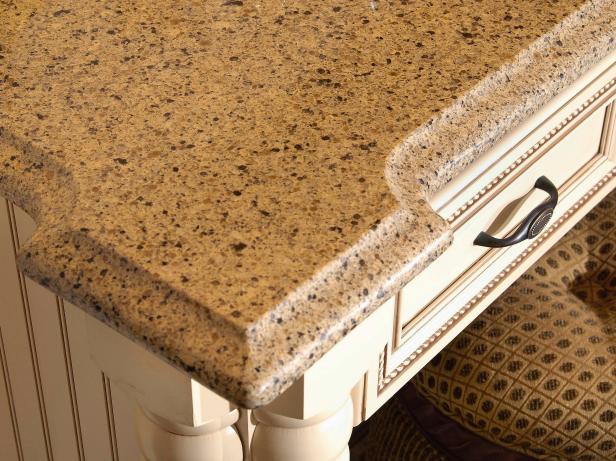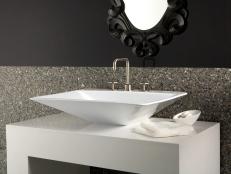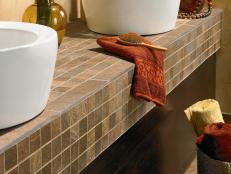Engineered Stone Countertops

LG
A wunderkind in the world of bathroom countertops, engineered stone emulates the style and texture of natural stone without the maintenance. The nonporous surface won't scratch, stain or crack, and it resists mold and mildew. Engineered stone countertop most often refers to quartz-based surfaces, though other options exist.
Quartz countertops, ranging from fine to coarse-grained, look and feel like natural stone, but with a little extra oomph. Consider these factors when choosing quartz:
- Measurements: Slabs are available in half inch, three quarter inch, and an inch and a quarter thicknesses. Thicker sizes are more expensive. Choose from at least 15 countertop edge options, from bull-nose to beveled. If you're worried about chipping, go with rounded edges.
- Color: Dozens of colors are available, and quartz offers one clear benefit over natural stone: more options than nature alone can provide. Just consider shades like apple martini green or funky crocodile-print surfaces. Colors range from quietly traditional to ultra hip.
- Finish: Options include polished (smooth and glossy), honed (with less sheen), and textured finishes.
- Practicality: One of the most practical options for busy baths, quartz stands up to staining, heat and scratching. Unlike natural stone, it never requires sealing.
- Sink Types: Options include drop-in, undermount and vessel styles.
Other Engineered Stone
While the term "engineered stone" usually refers to quartz countertops, some manufacturers produce other varieties of engineered stone. Consider these three:
- Granite: Generally crafted from 95 percent granite and five percent polymer resins, engineered granite is non-absorbent and resists heat, stains and scratches. Unlike granite recommendations, manufacturers note it will not be damaged by direct slicing of foods or contact from hot skillets.
- Marble: Typically composed of 93 percent marble and seven percent resin and pigments, engineered marble is more durable and consistent than cultured or quarried marble. It has a lower absorption rate and is easier to maintain, with no need for polishing.
- Semi-Precious Stones: Melding semi-precious stones (including quartz, amethyst, iron, jasper and agate) with petrified wood and fossils produces the ultimate in distinction. These surfaces are nonporous and durable, resisting scratches, stains and heat. The main drawback? The price, which starts at $380 per square foot.







































